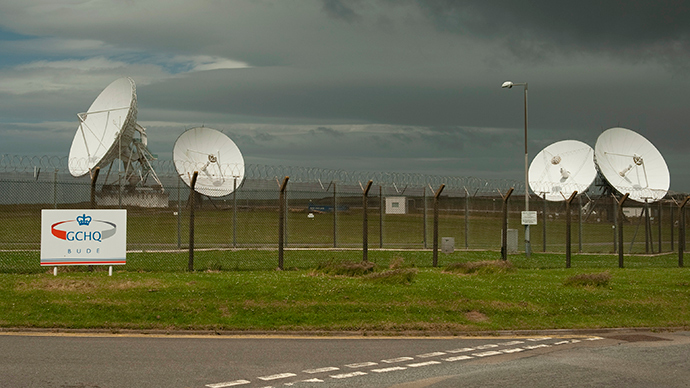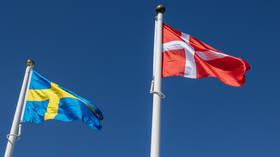DRIP displays British ‘intelligence’ in dealing with the world

After recent comments in Moscow by Edward Snowden about the extent to which private telecoms data is used by the UK and US governments, you might have expected British lawmakers to think twice about the Data Retention and Investigatory Powers bill.
A yarn attributed to Sean McBride recounts an interview from the 1950s when, while serving as Irish Foreign Minister, a journalist asked him: "What about the role of British Intelligence in Dublin?"
"If the British had some intelligence, that'd be great," replied the man who once led Amnesty International.
The British might often lack intelligence when dealing with the wider world, but their government intelligence services are amongst the most intrusive.
Amnesty - which McBride described as 'one of my children' - has been busy in recent weeks fighting new legislation in the UK that in the words of one Labour party MP is "democratic banditry resonant of a rogue state." The member in question, Tom Watson, added that "parliament has been insulted."
The issue is the Data Retention and Investigatory Powers (or DRIP, as everyone seems to be calling it) bill. The legislation enables GCHQ, the UK government's electronic communications-monitoring agency, to continue snooping on the email and mobile phone activity of British residents and others further afield.
British lawmakers managed to rush DRIP through in a mere seven days. In a parliament where Charles Stuart Parnell's Irish Home Rule Party used to make all-night speeches to obstruct proceedings, once reaching a record 22 hours, this is almost unheard of.
The Conservative Party-led British administration argues that DRIP was necessary because of a ruling by the European courts in April, which decreed that the intelligence services' powers to retain 'private' communications for two years was out of order. The Euro judges decided that such powers breached basic human rights and insisted that telecoms companies destroy the information - David Cameron's cabinet didn't like this.
Now, their spooks have even more powers than before - they can even force foreign companies to ensure their systems are capable of snooping, and have increased the powers so that email providers like Gmail can be compelled to hand over data. Great news for British intelligence but bad news for ordinary 'subjects' (the British haven't evolved to citizenship yet in legal terminology).
The Open Rights Group (ORG) is fighting DRIP on the basis that the law breaches the European Charter of Fundamental Rights and the UK's own Human Rights Act. Jim Killock, its director, complains that "the government has ignored a court judgment, ridden roughshod over our parliamentary processes and denied the public the debate they deserve."
"Blanket data retention is unlawful and we will fight against this legislation. Our message to Theresa May is: see you in court," he continues.

The aforementioned Ms May is the Home Secretary, a quaint term that survives an age when the English had more than 'Home' to govern. Nowadays, short of sitting in a dark room, closing their eyes and whistling Rule Britannia while their minds turn to long-gone halcyon days, 'home' is about all they need concern themselves about - and that might get even smaller if the Scottish decide to rule their own 'home' in September.
Ms May claims that DRIP is needed to register in law "powers and capabilities that exist today" which were hampered by the European court ruling back in spring. In other words, to hell with the human rights thing, British ways are best and our 'intelligence' says so.
Why the rush? Why a mere seven days (and just before the summer recess)? "If we delay we face the appalling prospect (that) police operations will go dark, that trails will go cold, that terrorist plots will go undetected - if that happens, innocent lives may be lost," Ms May elucidates. This sounds scary, but fear is an established British tactic to quell the populace when passing through laws which hinder their freedoms.
However, a group of 15 leading experts in technology law wrote an open letter to the London authorities last week explaining that this emotive claim was hokum. "The legislation goes far beyond simply authorizing data retention in the UK. In fact, DRIP attempts to extend the territorial reach of British interceptions powers... it introduces powers that are not only completely novel in the United Kingdom, they are some of the first of their kind globally."
The group, which includes academics from the usual suspects, Oxford and Cambridge, as well as LSE and Edinburgh, continues that DRIP is a "serious expansion of the British surveillance state."
Amnesty is also on the case and last week brought a legal challenge against a mass surveillance operation called Tempora, following revelations by Edward Snowden about UK and US intelligence practices. Of course, London has neither confirmed nor denied the existence of the operation. Amnesty's media lead Maxim Tucker says that "(it’s) dangerous for GCHQ not to measure whether surveillance is proportionate and necessary against a specific goal they want to achieve." The tribunal became farcical when Snowden's examples of data collection programs were barred from discussion. If it wasn't such a serious matter, it might be funny, but it is, so it’s not.
GCHQ, based in Cheltenham, an English town more famous for its annual horse racing festival, is the 'signals' branch of the UK intelligence services. It operates in partnership with the NSA and equivalent agencies in Canada, Australia and New Zealand - together these groups are often termed the 'five eyes.'

Edward Snowden claims that GCHQ is 'even worse than the NSA' and is permitted to go further in surveillance than similar agencies in other Western countries. He told The Guardian editor, Alan Rusbridger, in a recent Moscow interview that "they enjoy authorities that they really shouldn't be entitled to. Tempora is really proof... that GCHQ has much less-strict legal restrictions than other Western government intelligence.
"And what that means is UK citizens (sic) and UK intelligence platforms are used as a testing ground for all of the other five eyes partners," Snowden added. Tempora is a formerly secret operation which Snowden claims even goes so far as to monitor Facebook entries, from cat videos right up to birthday greetings - it's rather ludicrous to even fathom that terrorists would be organizing their campaigns on Facebook. But British intelligence thinks otherwise.
However, it's not just kitty videos that GCHQ are after. A leaked GCHQ document called 'JTRIG Tools and Techniques' alleges that they have developed covert tools to seed the internet with false information, likely of the kind witnessed after the MH17 disaster in Ukraine. It also insists that the Cheltenham spooks can manipulate the results of online polls (who's hot? Kimye or Brangenlina? They decide!) and artificially inflate page view counts on websites to make fake pages look more legitimate or popular. Furthermore, they can connect two unsuspecting phone users together in a call, which is something myself and my teenage friends used to do in the 90's from pay-phones when we were bored.
Additionally, the leaked document reports that GCHQ use "fake victim blog posts," "false flag operations" and "honey traps" as part of their arsenal, as well as monitoring Youtube and Facebook users and visitors to selected websites. It goes on to suggest that Cheltenham can monitor Skype users in real time - which raises questions about Microsoft's co-operation - and can spoof email addresses and send emails under that identity. So, the next time the Nigerian Lottery inform you of a big win, be careful, it could be GCHQ looking for your bank account details, which might be even worse.
Another alleged technique is that GCHQ employees may be using multiple anonymous Twitter accounts to discredit and harass journalists and activists that take a line contrary to the UK government’s position.
British intelligence has a track record of getting things majorly wrong. Back in 2003, they compiled what was known as the 'Dodgy Dossier', which was used to justify UK involvement in the US-led invasion of Iraq. The report claimed that Iraq could deploy biological weapons within 45 minutes of an order to do so. It later emerged that Iraq didn't even have such weapons at all.
In the 1970s and 80s, the spooks masqueraded as bar staff in Irish pubs across Britain in an attempt to gather information on IRA activities. The IRA were aware of this tactic and preferred to meet in the more rarified surrounds of bookshops and libraries according to former member Sean O'Callaghan - rendering the MI5 tactic a complete waste of time.
If other nations were so completely monitoring their citizens electronic activities, British liberals would be terming them 'rogue states' or 'totalitarian societies.' However, it's at home that these practices are being used, and despite some spirited campaigning by organizations such as Amnesty and ORG, the UK political class have closed ranks and continued to facilitate widespread snooping.
The statements, views and opinions expressed in this column are solely those of the author and do not necessarily represent those of RT.
The statements, views and opinions expressed in this column are solely those of the author and do not necessarily represent those of RT.













